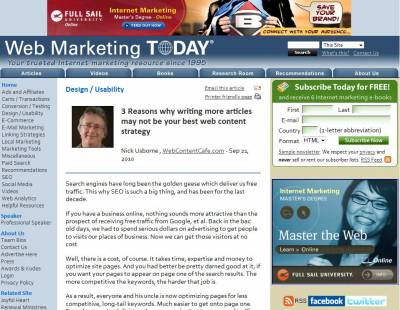Nick Usborne, from WebContentCafe.com, recently wrote a great article about how writing more articles may not be your best web content strategy. He goes on to explain that “The web is being flooded with short, low-quality, optimized articles…” and how “Google is catching on…”. He also goes on to explain that “Low-quality articles don’t get any traction through social media”. So how do you develop a strong, proven, web content strategy that is good for search engine optimization (SEO)?

If you are an ecommerce retailer and you sell products through a shopping cart on your web site, you need to develop a web content strategy whereas you create additional content around those products and link that content back to your web site. In order for a web page (a product) to rank well in the search engines, that web page needs to have links and references from other web pages on the internet. Generally speaking, in the past, one web content strategy for search engine optimization has been to write (or have someone else write) and article about each of your products: post them on other web sites and link them back to your product page. People (as well as the search engines) come across this web content and then come over to your web site.
Product reviews can also be a wonderful addition to your overall web content strategy. Certainly you could allow your web site visitors to write product reviews directly on your web site, but sometimes that can be too overwhelming. And if you don’t currently have any product reviews, it may be difficult to get your current customers to write them for you unless you offer some sort of incentive for them to do so. And, oftentimes, users don’t necessarily write product reviews that you like or that are written well enough to be posted on your web site. So, hiring someone to write in-depth product reviews (along with photos and a video) of the products you sell can be an asset: those product reviews can be put on your web site or they could be put on another web site, along with a link back to your product page.
Another web content strategy that some are beginning to embark on is to create videos of their products and actually show potential buyers how the product works. Certainly embedding the video on web site right there on the product page is good for users: and uploading the video to web sites like YouTube.com is recommended. Combine well-written articles and product reviews about the products you sell with videos of your products and you’re definitely on the right track when it comes to ranking better in the search engines.
But where do most of us fall flat on our faces during this whole entire process? Where do we fail? Why aren’t our well-written articles, product reviews, and even our product videos helping our organic search engine rankings?
Nick Usborne, as I previously mentioned, refers to the fact that people are now literally “flooding the internet” with low-quality articles. While creating this web content (writing an article and linking it back to your web site) is a step in the right direction, many people just leave it at that: they do not take the extra time to promote the articles and get links to the web content.
It all comes back to one basic principle: in order for a web page to rank well in the search engines, it absolutely must have links.
How do search engines like Google determine which content deserves to rise to the top? Google determines which articles, which videos, and which product reviews have more links than others. It’s all about the promotion of your web content. Nowadays, since so many web site owners are “flooding the internet” with web content, you have to take the extra step and promote your content. Unfortunately, you cannot just write an article or upload a video to YouTube.com without promoting that content. And even if you have the best article or a video that is so good that it should go viral on the internet, you have to take the extra step to tell people about it.
Certainly, there are literally dozens of ways to promote web content. You can rely on your own social networking, assuming that you have already taken the time to build up thousands of “friends” and “followers”. When you have new web content, tell your friends and followers about it. You can also employ the services of someone (or a firm) who already has thousands of contacts, friends, and followers who can help you spread the word about your content.
Even if you do not currently have a web content strategy, it’s time to start thinking differently about search engine optimization and SEO. You cannot just rely on optimizing your web pages and expect them to rank well in the search engines. Nowadays, your web content strategy needs to include setting up and maintaining a presence on the social media web sites as well as adding content to your web site, including articles and videos. And you need to always take it one step further and promote your content: something that apparently a lot of people are not doing yet. Competitive advantage?